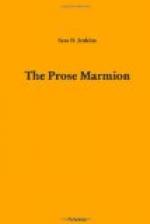The Knight replied:
“Norham Castle is a grim, dull cage for a bird so beautiful as the lady of Heron, and with my consent she sits with the noble and fair Queen Margaret, the bride of royal James.”
“Ah!” replied the Heron’s noble guest, “if this be so, I will gladly bear to her your tender messages. I am now, by the request of our good English King, on my way to the court of Scotland, to learn why James is gathering troops, why making warlike preparations, and, if it be possible, I am to persuade him to maintain the peace. From your great goodness, I make bold to ask for myself and for my train a trusty guide. I have not ridden in Scotland since James backed Richard, Duke of York, in his pretensions to the throne of England. Then, as you remember, I marched with Surrey’s forces, and razed to the ground the tower of Aytoun.”
“For such need, my lord, trust old Norham gray. Here are guides who have spurred far on Scottish ground, who have tasted the ale of St. Bothan, driven off the beeves of Lauderdale, and fired homes that the inmates might have light by which to dress themselves.”
“In good sooth,” replied Lord Marmion, “were I bent on war, a better guard I could not wish, but I go in form of peace, a friendly messenger to a foreign King. A plundering border spear might arouse suspicious fears, and the deadly feud, the thirst for blood, break out in unseemly broil. More fitting as guide, would be a friar, a pardoner, traveling priest, or strolling pilgrim.”
Sir Hugh musingly passed his hand over his brow, and then replied: “Fain would I find the guide you need, but, though a bishop built this castle, few holy brethren resort here. If the priest of Shoreswood were here, he could rein your wildest horse, but no spearsman in the hall will sooner strike or join in fray. Friar John of Tilmouth is the very man! He is a blithesome brother, a welcome guest in hall and hut. He knows each castle, town and tower in which the ale and wine are good. He now seldom leaves these walls, but, perchance, in your guard he will go.”
In the pause that followed, young Selby, nephew of the Earl of Norham, respectfully said, “Kind uncle, unhappy we, if harm came to Friar John. When time hangs heavy in the hall, and the snow lies deep at Christmas tide, when we can neither hunt nor joust, who will sing the carols, and sweep away the stake at bowls? Who will lead the games and gambols? Let Friar John in safety fill his chimney corner, roast hissing crabs, or empty the flagons. Last night, there came to Norham Castle a fitter guide for Lord Marmion.”
“Nephew,” said Sir Hugh, “well hast thou spoke. Say on.”
“There came here, direct from Rome, one who hath visited the blessed tomb, and worshipped in each holy spot of Arabia and Palestine. He hath been on the hills where rested Noah’s Ark; he hath walked by the Red Sea; in Sinai’s Wilderness, he saw the mount where Moses received the law. He knows the passes of the North, and is on his way to distant shrines beyond the Forth. Little he eats, and drinks only of stream or lake. He is a fit guide for moor and fell.”




